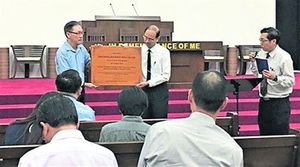Imagine the great damage done to the cause of the gospel when an unbeliever finds out that a Christian is lying, whether in the office, to his spouse or friends, or in some other way.
Sometimes we excuse ourselves and ease our consciences by claiming that we are telling half-truths rather than lies. But if it is intended to mislead, a half-truth is still a lie.
Concern
It is a matter of great concern that many professing Christians today have, perhaps without thinking, adopted the world’s standards of morality and truthfulness. But there is no room for such compromises in the life of a true follower of Christ.
When a person comes to Christ, his entire life has changed and he is both obliged and privileged to walk uprightly, that is, in righteousness and sanctification.
As a result he will strive to be upright and truthful. This is only possible, of course, in the strength of ‘the Holy Spirit who was given to us’ at our conversion (Romans 5:5). But the believer also must make a conscious effort to follow Christ in this (and other) respects.
Made straight
Uprightness, in its original meaning, has the sense of ‘made straight’ or right, or smooth. It is a straight and smooth pathway without twists and bends.
It also has the meaning of purity, incorruptibility and right-ness as opposed to wrong-ness. Uprightness is a Christian virtue which God, by means of the Word, has planted in the hearts of believers, whereby they do the will of God in truth.
The breastplate of righteousness is part of the armour of God (Ephesians 6:10-18). Although this speaks primarily of the imputed righteousness of Christ, the believer’s ‘newness of life’ will reflect his standing as one made righteous by grace (see Romans 6:1-4).
Special place
The psalmist writes: ‘Mark the perfect man, and behold the upright: for the end of that man is peace’, and again, ‘Light is sown for the righteous, and gladness for the upright in heart’ (Psalm 37:37; 97:11).
The upright have a special place in the sight of God. We are all depraved and wretched by nature, and it is Christ’s imputed righteousness that has rendered us acceptable to God in the first place. But this access to God brings both the privilege and responsibility of reflecting his character in our own.
One consequence is that truth and uprightness should characterise the life of the regenerate person. There is no place for deceit and falsehood in the believer, for God is truth (Deuteronomy 32:4).
Truth in every part
There is, firstly, a truthfulness which pertains to the intellect. A mind illuminated by the Holy Spirit and the Word of God perceives and understands divinely revealed matters. To be thus illuminated is to have the mind of Christ (1 Corinthians 2:14-16).
There is, secondly, a truthfulness of the heart. This refers to honesty and integrity before God and men. It means walking in the truth (2 John 4) inwardly and without corruption and falsehood.
There is, thirdly, a verbal truthfulness, when the words we speak and the sentiments we utter are in harmony with the truthful heart.
Ephesians 4:25 says: ‘Wherefore putting away lying, speak every man truth with his neighbour: for we are members one of another’.
Objectives
There is also a truthfulness of motive and intent, when our objectives are in harmony with the will of God. God himself is the cause of uprightness, for he has imputed to us the righteousness of Christ that we may walk before him as followers and imitators of his Son.
Genesis 17:1 relates: ‘when Abram was ninety years old and nine, the Lord appeared to Abram, and said unto him, I am the Almighty God; walk before me, and be perfect’, while Deuteronomy 18:13 adds: ‘You shall be perfect with the Lord your God’.
This does not refer to sinless perfection, but it does set the highest possible standards for the believer.
Negative example
It is sometimes helpful to give a negative example. In the Old Testament, King Saul had a problem with uprightness when he was confronted by Samuel the prophet (1 Samuel 15).
He offered excuses why he had not carried out the Lord’s instructions to destroy everything. When reproved, he was not truly repentant but tried to get away with smooth talking (vv. 20-25).
He was not sincere, but tried to avoid the blame and put it on ‘the people’ instead. His subsequent action revealed that he was not truly repentant.
When he said ‘the people took of the plunder … to sacrifice to the Lord’, he was telling a half-truth, and that is an affront to God.
Deterrent
Gehazi was another who was guilty of deceit. He told the Syrian general, Naaman, that his master, Elisha, had changed his mind about accepting a gift and had sent him to collect it. But, of course, the whole story was fabricated by himself for the purpose of unrighteous gain.
He paid dearly and his punishment was swift. Even as he coveted the reward, the leprosy from which Naaman had been cleansed settled upon him (2 Kings 5:20-27).
When Abraham lied to Abimelech about his wife Sarah, he was in big trouble until the Lord graciously delivered him and his family (Genesis 12:13–20).
Turning to the New Testament, there was an occasion in the life of the early church, when a couple decided to tell a half-truth concerning the giving of their possession to God (Acts 5:1–4).
They saw the popularity that Barnabas enjoyed when he gave up all his possessions, and they wanted the same treatment. But they were not prepared to pay the price.
It was true that they sold land and gave to the church. But their claim that they had given all the proceeds was not. It was not wrong for them to withhold a proportion of the money, but it was wrong to feign a greater generosity than they actually bestowed.
They were severely punished, the Lord taking their lives as a deterrent, especially necessary in the early stage of the church so that deceit would not become a cancer in the body of Christ.
Testimony
There are those who have wicked designs but cover them with fair speech. David describes them in this way in Psalm 62:4: ‘They only consult to cast him down from his excellency: they delight in lies: they bless with their mouth, but they curse inwardly’.
Even the world recognises that perjury is a serious offence, punishable in a court of law. Still less should believers engage in double talk and hypocrisy. If we are Christ’s, we are partakers of the divine nature.
Noah is described as a just and perfect man in his generation (Genesis 6:9). Unlike the rest of his contemporaries, he was honest and morally upright, and dutifully followed the commandments of God.
Another positive example is Job who gave a good testimony as an upright and honest man (Job 1:1). As a result, God greatly blessed and honoured him, both before and after his sore trial of suffering.
David was another upright and fruitful person (Psalm 18:23). Though he was far from sinless, and fell grievously, he was restored to the throne and God greatly multiplied his kingdom and his descendants.
Reward
God will greatly reward those who are upright. Proverbs 11:20 states: ‘They that are of a froward heart are an abomination to the Lord: but such as are upright in their way are his delight’.
Daniel’s example is worth noting. A man of blameless life, he was promoted to the second highest rank in the kingdom, subordinate only to the king of Persia himself.
In fact, in describing those who qualify for fellowship with God, the Psalmist declares: ‘Lord, who shall abide in thy tabernacle? Who shall dwell in thy holy hill? He that walketh uprightly and worketh righteousness, and speaketh the truth in his heart’ (Psalm 15:1–2).
This is the clearest possible statement that, to God, purity of heart is more important than outward actions and appearances. Truthfulness before God and men is paramount in our Christian life.
A liar loses credibility and is rarely trusted the next time. The Christian should strive for a good Christian testimony (2 Corinthians 3:2-3), and that will include honest speech and upright character.
Let our speech be ‘yea, yea’, and ‘nay, nay’, and not prevaricate or falsify the truth. ‘Let your speech be always with grace, seasoned with salt, that ye may know how ye ought to answer every man’ (Colos-sians 4:6).


















